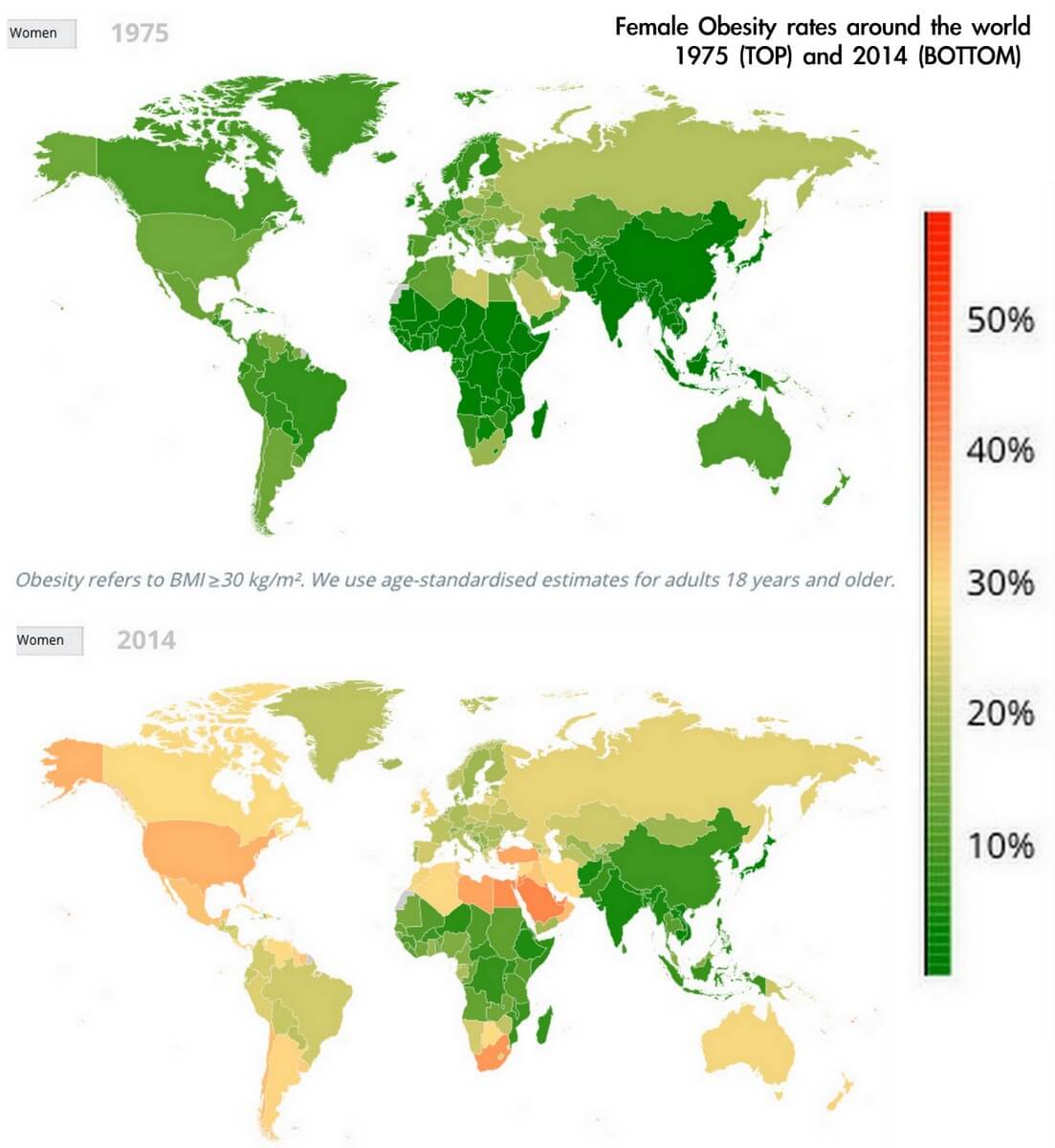For the first time, there are more obese people than underweight people in the world. A newly published study predicts that if this global obesity trend continues, then almost 18 percent of men and 21 percent of women will be obese by 2025. That’s one in five adults.
This new study, led by scientists from Imperial College London, was published in The Lancet and is the largest global dataset on obesity to date. Study authors, led by Professor Majid Ezzati, collaborated with over 700 public health officials around the world to collect data. They reviewed BMI data* from almost 20 million people in 186 countries between 1975 and 2014.
Looking at the data, study authors determined that the number of obese people in the world rose to 641 million in 2014, from 105 million in 1975. At the other end of the spectrum, the proportion of underweight people in the world fell about a third, from 13.8 percent to 8.8 percent of men and from 14.6 percent to 9.7 percent of women.
Some Highlights From the Study:
- For men, the obesity rate more than tripled over the past four decades, rising from 3.2 percent to 10.8 percent.
- For women, the obesity rate more than doubled over the past four decades, rising from 6.4 percent to 14.9 percent.
- The USA still has the highest number of severely obese men and women in the world.
- Japanese men and women have the lowest BMI in the high-income world.
- Average BMI is higher in English-speaking high-income countries than in non-English-speaking high-income countries, with American men and women having the highest BMI of any high-income country.
- The lowest BMIs in Europe are among Swiss women and Bosnian men.
- The country with the highest average BMI is American Samoa.
 Change in female obesity rates around the world. Maps via NCD RisC.
Change in female obesity rates around the world. Maps via NCD RisC.
Battling the Global Obesity Epidemic
Professor Ezzati stated: "The number of people across the globe whose weight poses a serious threat to their health is greater than ever before. And this epidemic of severe obesity is too extensive to be tackled with medications such as blood pressure lowering drugs or diabetes treatments alone, or with a few extra bike lanes.”
Professor Ezzati calls for collaborative global initiatives to address what is now a worldwide obesity epidemic. “We hope these findings create an imperative to shift responsibility from the individual to governments and to develop and implement policies to address obesity,” he said in a statement. “For instance, unless we make healthy food options like fresh fruits and vegetables affordable for everyone and increase the price of unhealthy processed foods, the situation is unlikely to change.”
The statistics, trends, and predictions seem dire, but there are some high-income countries in which the rate of obesity has not increased over the last 40 years, including Switzerland, France, Japan, South Korea, and Singapore. Professor Ezzati told The World Today that these wealthy countries have avoided widespread obesity with a better overall “food environment.”
“It is more likely in continental Europe for people to be eating fresh and whole foods, and it’s a lot more likely in the English-speaking world for the food to be more processed and less ... wholesome and fresh. So I think perhaps the food environment, especially for the lowest income groups who have the least ability to buy fresh food, must be a part of this story ... and hopefully a part of the solution, if we think on it.”
Graphic via CNN.
* What is BMI?
BMI stands for body mass index, and is the ratio of weight to height squared. Some individuals like professional athletes might have higher BMIs but not too much fat. For the vast majority of people, however, the BMI is a good way to gauge body fat. Risk of chronic health problems including heart disease and type 2 diabetes rises progressively as BMI increases.
Sources:
http://www3.imperial.ac.uk/newsandeventspggrp/imperialcollege/newssummary/news_31-3-2016-22-34-39
http://www.abc.net.au/worldtoday/content/2016/s4435413.htm
http://www.thelancet.com/journals/lancet/article/PIIS0140-6736(16)30054-X/abstract
http://www.eurekalert.org/pub_releases/2016-03/tl-tlw033016.php
http://www.ncdrisc.org/map-obesity-prevalence.html

Related News
Save 40% This WeekOn Forks Meal Planner

Forks Meal Planner takes the hard work out of making nutritious meals the whole family will enjoy.
SAVE $200 ON OUR ULTIMATE COURSE

Join our best-selling course at a new lower price!



